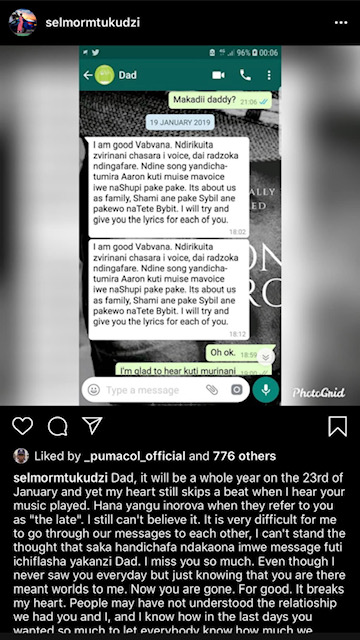
23rd January will be the 1 year anniversary to when Samanyanga Oliver Mtukudzi passes away. Selmor Mtukudzi his daughter has been carrying the touch of the Mtukudzi family by singing and performing like her father did for over 50 years.
Selmor Mtukudzi posted a message between herself and her father Oliver Mtukudzi while he was ill. In the message he tells her that he was feeling better but he had not got his voice back and was hoping to get it back soon. He tells her that he has a song he wants to sing with her which celebrates their family and has parts for everyone .

Selmore also wrote an emotional message to her father "Dad, it will be a whole year on the 23rd of January and yet my heart still skips a beat when I hear your music played. Hana yangu inorova when they refer to you as "the late". I still can't believe it. It is very difficult for me to go through our messages to each other, I can't stand the thought that saka handichafa ndakaona imwe message futi ichiflasha yakanzi Dad. I miss you so much. Even though I never saw you everyday but just knowing that you are there meant worlds to me. Now you are gone. For good. It breaks my heart. People may have not understood the relatioship we had you and I, and I know how in the last days you wanted so much to let everybody know how .
Related Story
Oliver Mtukudzi, whose singing and guitar playing harnessed influences from across Southern Africa to create the most popular musical style in Zimbabwe, died on Jan. 23 in Harare, the nation’s capital. He was 66.The cause was heart failure related to diabetes, said Damon Forbes, a record executive and promoter who had worked with Mr. Mtukudzi for more than 20 years.Starting in the late 1970s, Mr. Mtukudzi (pronounced muh-too-KOOD-zie) recorded numerous albums — 67, by his count — and became a hero throughout Africa. The Zimbabwean music journalist Alex T. Magaisa wrote hat Mr. Mtukudzi was “arguably Zimbabwe’s finest ambassador.”Though an official figure was not available, conservative estimates suggest that Mr. Mtukudzi sold millions of albums over the past 40 years.
e sang anthems of social lament and timeless wisdom, typically in Shona, Zimbabwe’s predominant language, but also in English and Ndebele. His music pulled from traditional Shona rhythms and sounds while incorporating influences from South Africa’s more cosmopolitan, jazz-inflected mbaqanga tradition, as well as African-American dance music. What resulted — a kind of soundtrack to Zimbabwean life in the late 20th century — became known as its own idiom, called “Tuku music,” after Mr. Mtukudzi’s nickname.
“I looked for a sound the guitar couldn’t make, in a guitar‚” he told the South African publication TshisaLIVE in an interview shortly before his death, remembering his early years. “Professional guitarists at the time used to laugh at me. I used to look for a mbira on the guitar strings,” he said, referring to a traditional.In the 1970s, as a member of the band Wagon Wheels, he played alongside the singer Thomas Mapfumo, who would become the only other Zimbabwean musician with a reputation to rival his. Mr. Mapfumo left the country in the 1990s and became well known in the West. Mr. Mtukudzi stayed, and cemented his status as the country’s most renowned musician.
His popularity in Zimbabwe reflects the fact that in a country bitterly divided by political allegiances, he positioned himself as a unifier. While Mr. Mapfumo took a strong political stance in his music — pioneering a genre known as chimurenga (“revolutionary struggle music” in Shona) before the fall of white minority rule, then vigorously criticizing Robert Mugabe, who ruled the country from 1980 to 2017 — Mr. Mtukudzi generally avoided taking a political side. He sang at events for the ruling ZANU-PF party, as well as the wedding and funeral of the opposition leader Morgan Tsvangirai.But his songs boldly told the stories of his communities, and he made no effort to avoid social issues. Perhaps his biggest hit was Todii a cautionary song about the perils of H.I.V. from the 1997 album “Tuku Music.” Powered by a melancholy chorus of background singers and the gravelly lament of Mr. Mtukudzi’s lead vocal, it warned listeners of the virus that by then had infected a quarter of Zimbabwe’s population.